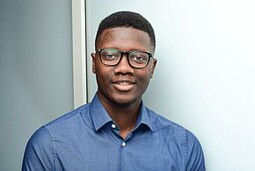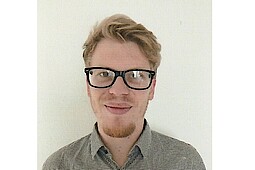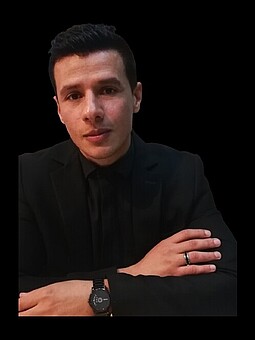Doktorand*innen
Auf dem Weg zu einer kooperativen Promotion
Auf dieser Seite sind die Doktoranden an unserem Department in alphabetischer Reihenfolge aufgelistet, die von ihrem Betreuer hier angemeldet wurden. Die Partneruni für die kooperative Promotion ist angegeben, wenn von dort bereits eine Betreuungszusage vorliegt. Genannt wird das Promotionsthema oder das Forschungsprojekt (gegebenenfalls mit Link). Soweit bereits Publikationen vom Doktoranden vorliegen wird auf diese über das Repositorium der HAW Hamburg verlinkt.
Olivares Ferrer, Aurelio Jose (M.Sc.)

Betreuender Professor: Prof. Dr.-Ing. Dipl.-Kfm. Markus Linke
Name der Universität : Universitat Politècnica de València
Forschungsprojekt: Residual strength and delamination growth prediction in carbon fiber reinforced plastics components with re-infiltrated barely visible impact damage
Publikationen: Liste der Veröffentlichungen
The goal of this PhD project is to investigate models and methods for determining the residual strength and delamination growth of re-infiltrated barely visible impact damages (BVID) in carbon fiber reinforced plastics (CFRP) components. This type of damage must be repaired in civil aviation and, due to approval requirements, the damaged area is removed and replaced by a riveted patch, which is a high time-consuming and cost-intensive method. As a result, a certification method for an alternative BVID repair technique is being investigated, in which the damage is not removed but stabilized by resin infiltration in such a way that no further damage growth occurs. Such a certification method requires models for determining the residual strength and delamination growth, which are a central prerequisite for the use of this re-infiltration repair for load-bearing CFRP components in civil aviation.
Kontakt: Aurelio Jose Olivares Ferrer
Nzeke Zedom, Arold (M.Sc.)

Betreuender Professor: Prof. Dr.-Ing. Dipl.-Kfm. Markus Linke
Name der Universität : Universitat Politècnica de València
Forschungsprojekt: Fast and reliable design of adhesively bonded repairs of carbon fiber reinforced plastic components for primary structures in civil aviation.
Publikationen: Liste der Veröffentlichungen (Link noch nicht hinterlegt)
Previous methods for repairing carbon fibre reinforced plastics (CFRP) result in the cutting of fibres, and hence the introduction of stress concentrations, both of which reduce structural integrity. Adhesive bonding is a lightweight joining method and offers several advantages over bolted/riveted joints (corrosion-free, weight-saving, provides a smooth surface, etc). Aircraft have to fly, they cost money on the ground (handling, maintenance, etc.). Long ground times must be reduced as much as possible. A fast and reliable design for the repair of CFRP components reduces the economic losses caused by long ground times when operating a civil aircraft.
The current dimensioning approach is typically based on the assumption of a complete loss of the load-bearing capacity of the bonded joint and there is still a lack of reliable failure criteria that are relevant for the wider application of bonded joints in primary civil aircraft structures. Accurately predicting the strength of bonded joints is important to reduce the number of costly tests in the design phase.
The aim of this Ph.D. project is to develop a fast and reliable design methodology for bonded repairs on CFRP for primary civil aircraft structures by using an efficient finite element technology to reduce the calculation time. Patches are usually used for CFRP repairs. Different adhesive joints such as single lap, scarf or stepped lap joint are to be considered as a suitable repair concept for the design of adhesive joints. Therefore, the aim of the project is to show that the finite-element method (FEM) can be used to quickly design models that can reliably predict the strength in CFRP bonded joints.
Kontakt: Arold Nzeke Zedom
Rose, Philip Frederic (M.Sc.)

Betreuender Professor: Prof. Dr.-Ing. Dipl.-Kfm. Markus Linke
Name der Universität : Universitat Politècnica de València
Forschungsprojekt: Experimental and numerical investigation into the fatigue behaviour of Carbon Fiber Reinforced Plastics components in adhesively bonded joints
Adhesive bonding has enormous lightweight potential, especially for carbon fibre reinforced plastics (CFRP) in aircraft design. However, this potential cannot yet be fully exploited in CFRP primary structures because the damage tolerance behaviour of bonded joints cannot be validly predicted. Typical damage occurs at the bond line in the form of cohesive as well as adhesive failure, but the joined parts themselves can also experience interlaminar damage (delamination) as well as intralaminar damage (like matrix cracks in individual layers of a laminate). Matrix cracking can trigger progressive damage both at the bond line as well as in the adherends. For a valid prediction of the fatigue behaviour of such bonded joints, the idealisation of damage initiation as well as damage growth and their interactions with other individual damage forms is consequently of central importance. The aim of this PhD project is therefore, on the one hand, the experimental characterisation of the interaction between delamination and matrix cracks under fatigue loading, both with and without the presence of an adhesive layer. On the other hand, models for finite element simulations are to be developed that can represent the formation of matrix cracks and their interaction with delamination.
Kontakt: Philip Frederic Rose
Sahraoui, Mohamed (M.Sc.)

Betreuender Professor: Prof. Dr.-Ing. Dieter Scholz, MSME
Name der Universität : Ecole Militaire Polytechnique (EMP)
Forschungsprojekt: Aerodynamic Design Optimizing of UAVs
Publikationen: Liste der Veröffentlichungen
Fixed wing unmanned aerial vehicles (UAV) are used in a variety of applications such as surveillance, mapping, and parcel delivery. Design and optimization is required for wing, empennage, propeller, and structure. An engine with proper parameters is selected. The control system is configured. The PhD thesis has its emphasis on aerodynamic design methods of fixed wing UAV for optimum performance. Open-source software is used to reduce computation time and design costs.
Kontakt: Mohamed Sahraoui
